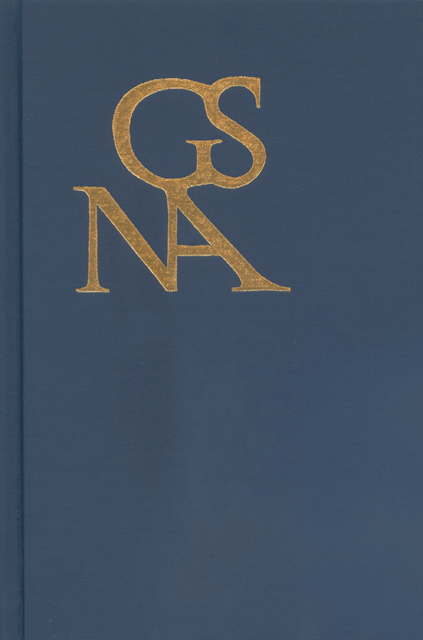Book contents
- Frontmatter
- Contents
- Thomas P. Saine (1941–2013)
- On the Logic of Change in Goethe’s Work
- Space and Place in Goethe’s “Alexis und Dora”
- Countermemory in Karoline von Günderrode’s “Darthula nach Ossian”: A Female Warrior, Her Unruly Breast, and the Construction of Her Myth
- Bad Habits of the Heart: Werther’s Critique of Ill Humor in the Context of Contemporary Psychological Thought
- Confessions of a Childless Woman: Fictional Autobiography around 1800
- Faust’s Begehren: Revisiting the History of Political Economy in Faust II
- Sacrifice in Goethe’s Faust
- Constructions of Goethe versus Constructions of Kant in German Intellectual Culture, 1900–1925
- Das Innere der Natur und ihr Organ: von Albrecht von Haller zu Goethe
- Die Titelkupfer von Moritz Retzsch zu Goethes Ausgabe letzter Hand
- Zu Goethe und der Islam—Antwort auf die oft aufgeworfene Frage: War Goethe ein Muslim?
- Book Reviews
On the Logic of Change in Goethe’s Work
Published online by Cambridge University Press: 02 June 2023
- Frontmatter
- Contents
- Thomas P. Saine (1941–2013)
- On the Logic of Change in Goethe’s Work
- Space and Place in Goethe’s “Alexis und Dora”
- Countermemory in Karoline von Günderrode’s “Darthula nach Ossian”: A Female Warrior, Her Unruly Breast, and the Construction of Her Myth
- Bad Habits of the Heart: Werther’s Critique of Ill Humor in the Context of Contemporary Psychological Thought
- Confessions of a Childless Woman: Fictional Autobiography around 1800
- Faust’s Begehren: Revisiting the History of Political Economy in Faust II
- Sacrifice in Goethe’s Faust
- Constructions of Goethe versus Constructions of Kant in German Intellectual Culture, 1900–1925
- Das Innere der Natur und ihr Organ: von Albrecht von Haller zu Goethe
- Die Titelkupfer von Moritz Retzsch zu Goethes Ausgabe letzter Hand
- Zu Goethe und der Islam—Antwort auf die oft aufgeworfene Frage: War Goethe ein Muslim?
- Book Reviews
Summary
FROM A PLENARY LECTURE delivered to a conference entitled “Metamorphoses: Goethe and Change” one might well have expected something new: a transformation of our views about Goethe. I hope it won't seem like ingratitude toward the organizers if I disappoint this expectation and, rather than trying to be innovative, take up one of the oldest questions to have animated the study of Goethe. It is the question posed by Friedrich Schlegel in that section of his Gespräch über die Poesie (Discourse on Poetry) entitled Versuch über den verschiedenen Stil in Goethes früheren und späteren Werken (Essay on the Varying Styles in Goethe's Early and Later Works). Of course, when the Gespräch appeared in the third volume of the Athenäum, the question Schlegel raised was very much a new kind of question. For he was not interested in applying traditional concepts of style to Goethe's work, in assessing Goethe's range or virtuosity, or in assigning works to categories that could be applied comparatively to other authors. Rather, Schlegel was after what he calls Erkenntnis, and the object of that Erkenntnis was not to be something describable with predicates like high or low, humble or grand, florid or plain. Rather, Schlegel's self-declared project was “den Dichter selbst zu verstehen” (“to understand the poet himself”), and that is to say: “die Geschichte seines Geistes … zu ergründen” (“to discover the history of his spirit”). In 1800, this was a new object of knowledge: the logic of development that exhibits itself across the diachronic distribution of a writer's works. It is not accidental that this object emerged into view and became the focus of attention and investigation with regard to Goethe's literary career. Could Schlegel have written in the same way, say, about Wieland? The negative answer, I assume, is self-evident. And the inference I draw from this is that, with Goethe, the very nature of change, as it becomes intelligible across an author's career, changed. It became something, perhaps the primary something, to be, as Schlegel put it, understood.
In what follows I want to place myself in the tradition that flows from Schlegel's brief essay. My essay attempts to work out something like the logic of change immanent in the development of Goethe's works. The project—and this too is continuous with Schlegel's thinking—locates the level at which change is registered fairly deeply within the works’ structural complexion.
- Type
- Chapter
- Information
- Goethe Yearbook 21 , pp. 1 - 22Publisher: Boydell & BrewerPrint publication year: 2014

